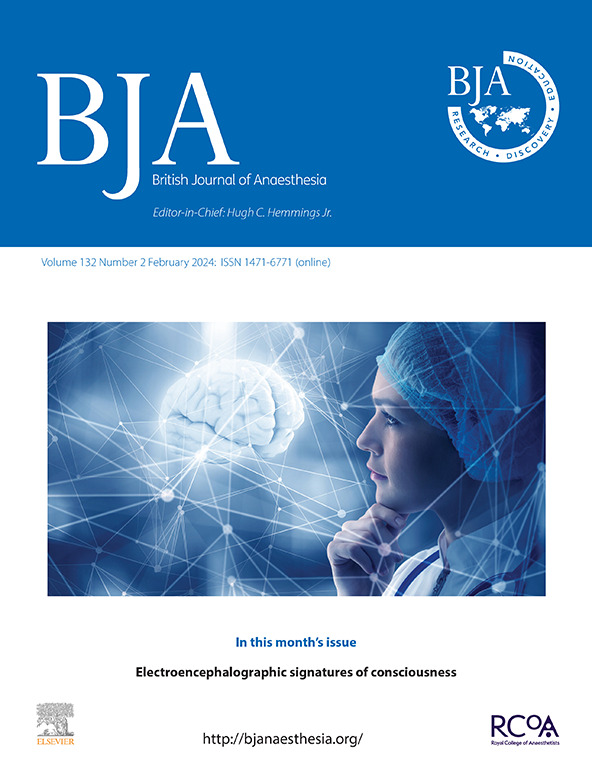围手术期神经认知障碍的多基因和基于apoe的遗传风险评估:外科患者的生物库研究。
IF 9.2
1区 医学
Q1 ANESTHESIOLOGY
引用次数: 0
摘要
背景术前风险评估是制定有针对性的预防和治疗策略的关键步骤。尽管遗传生物标志物在评估和分层痴呆风险方面显示出相当大的希望,但它们在围手术期的应用仍未得到探索。鉴于手术和麻醉对围手术期认知轨迹的影响,本研究旨在评估手术人群术前神经认知遗传风险概况及其对术后结果的影响。方法分析麻省总医院布里格姆生物银行40-89岁、既往无阿尔茨海默病诊断的男性和女性手术患者的数据。计算阿尔茨海默病的多基因风险评分,并从研究参与者中推断载脂蛋白E (APOE)基因型。采用Logistic回归检验APOE基因型与阿尔茨海默病合并神经认知障碍的多基因风险评分之间的关系。结果手术人群共33 526例,其中86%为欧洲血统,25%携带至少1个APOE-ε4等位基因。在欧洲血统的患者中,阿尔茨海默病的多基因风险评分与阿尔茨海默病的高风险相关(优势比[OR], 2.25[95%置信区间,1.64-3.09];错误发现率[FDR] <0.001)。携带APOE-ε4等位基因的患者发生神经认知障碍(如谵妄)的风险增加:OR为1.32 [1.19-1.47],FDR <0.001;轻度认知障碍:OR为1.70 [1.49-1.94],FDR <0.001;阿尔茨海默病:OR为3.42 [2.72-4.29],FDR <0.001)。结论sape基因分型和多基因风险评分对外科人群神经认知遗传风险谱的探索具有重要价值,并有可能增强术前风险评估策略。本文章由计算机程序翻译,如有差异,请以英文原文为准。
Perioperative polygenic and APOE-based genetic risk assessment for neurocognitive disorders: a biobank study of surgical patients.
BACKGROUND
Preoperative risk assessment is a critical step in developing targeted preventive and therapeutic strategies. Although genetic biomarkers have shown considerable promise in assessing and stratifying dementia risk, their application in the perioperative period remains unexplored. Given the recognised effects of surgery and anaesthesia on perioperative cognitive trajectories, this study aimed to evaluate the preoperative neurocognitive genetic risk profiles of a surgical population and their influence on postoperative outcomes.
METHODS
Data from the Mass General Brigham Biobank were analysed for male and female surgical patients aged 40-89 yr without a previous diagnosis of Alzheimer's disease. The polygenic risk score for Alzheimer's disease was calculated, and apolipoprotein E (APOE) genotypes were inferred from the study participants. Logistic regression was used to examine the associations between APOE genotype and the polygenic risk score for Alzheimer's disease with neurocognitive disorders.
RESULTS
The surgical population comprised 33 526 patients, of whom 86% had European ancestry and 25% carried at least one APOE-ε4 allele. Among patients of European ancestry, the polygenic risk score for Alzheimer's disease was associated with higher risk of Alzheimer's disease (odds ratio [OR], 2.25 [95% confidence interval, 1.64-3.09]; false discovery rate [FDR] <0.001). Patients carrying APOE-ε4 alleles had an increased risk of neurocognitive disorders (e.g. delirium: OR, 1.32 [1.19-1.47], FDR <0.001; mild cognitive impairment: OR, 1.70 [1.49-1.94], FDR <0.001; and Alzheimer's disease: OR, 3.42 [2.72-4.29], FDR <0.001).
CONCLUSIONS
APOE genotypes and polygenic risk scores are valuable for exploring neurocognitive genetic risk profiles in surgical populations and have the potential to enhance preoperative risk assessment strategies.
求助全文
通过发布文献求助,成功后即可免费获取论文全文。
去求助
来源期刊
CiteScore
13.50
自引率
7.10%
发文量
488
审稿时长
27 days
期刊介绍:
The British Journal of Anaesthesia (BJA) is a prestigious publication that covers a wide range of topics in anaesthesia, critical care medicine, pain medicine, and perioperative medicine. It aims to disseminate high-impact original research, spanning fundamental, translational, and clinical sciences, as well as clinical practice, technology, education, and training. Additionally, the journal features review articles, notable case reports, correspondence, and special articles that appeal to a broader audience.
The BJA is proudly associated with The Royal College of Anaesthetists, The College of Anaesthesiologists of Ireland, and The Hong Kong College of Anaesthesiologists. This partnership provides members of these esteemed institutions with access to not only the BJA but also its sister publication, BJA Education. It is essential to note that both journals maintain their editorial independence.
Overall, the BJA offers a diverse and comprehensive platform for anaesthetists, critical care physicians, pain specialists, and perioperative medicine practitioners to contribute and stay updated with the latest advancements in their respective fields.

 求助内容:
求助内容: 应助结果提醒方式:
应助结果提醒方式:


